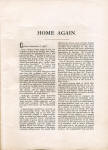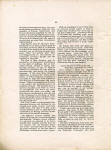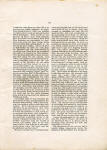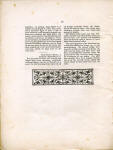| |
eur065 |
London,
September 3, 1889.
Dear Citizen:—Once more in the metropolis,
to find it as muddy and dingy and crowded and disagreeable as it was
one month ago. Yet there is hope for
it, because the horrid Strand is blockaded
by workmen laying mains for electric
lighting, which, it is to be hoped, will
banish the multitude who "prefer
darkness rather than light." No better step
can be taken towards stopping the
beastly immorality of this
city than a free introduction
of electricity.
On
yesterday we jolted along at a rapid
rate over the roughest
road we ever traversed from Paris to
Dieppe, and there took a very inferior steamboat for England.
To give you an idea of the notions
that these people have of
accommodating travelers, one of our ladies being fatigued
we asked for a stateroom, that she
might lie down for the three hours we were on
the Channel. "Oh, yes; you can have
it. The charge will be thirty
shillings." Great heavens!
Seven dollars and a half for
a stateroom for three hours!
Although provided with first-class
tickets we scarcely found chairs or
benches to sit comfortably, and were glad
when the chalk bluffs
appeared and we could part company
with the seasick strangers
with whom we had been pent
up.
A
most happy coincidence occurred as
we
were leaving Paris. The long train was almost filled, and as we were
late
we
anxiously sought a compartment,
when we heard our name called, and behold,
five splendid North Carolinians
were ready to grasp hands
and take us into their carriage. This
party consisted of three gentlemen and two ladies, the
Messrs. Wood and sisters, of
Edenton. We had last met as
members of the happy company
sailing across the sound from
Edenton to Avoca, and you may be sure
this meeting was appreciated by us. How earnestly each inquired for the
latest
news from the dear old State, which happily
was all good, and compared notes of
experiences in Europe. We concluded
that they had not had as
fine a time as we, but they will
stay longer and be able to
visit the Highlands of Scotland, which
we so wish to do if we only had the
time.
One
of the great places of rendezvous
for Americans in London is the office of
Brown, Shipley & Co. Their letters of
credit are universally used, and they have
proven exceedingly polite and accommodating.
This morning, among scores of
States folk there, we met Mr. Frank S.
Coxe, who is
preparing to sail on the 7th, a day later than we, but by a faster
steamer, so that he will be again at
Battery Park [Hotel] by the date of our arrival in
New
York. .
No doubt you are glad to
think that this will probably be the last of our European letters, and
as we may not have a chance to bore you again for a fortnight, we will
inflict a little moralizing, which
the discomforts of London always
have a tendency to develop.
We
have endeavored to compare the
United States with the
European countries that we have been so fortunate as
to visit, and the result is to make
us more and more satisfied with our own, and thankful that our
destiny is to live and die a citizen
of America. In many respects
we are even now ahead, not only in the comforts but the decencies of
life. To have gained this pre-eminence in the short space of one
century, to compete with these nations of boundless wealth
and the experiences of many hundreds of years, can be accounted
for in no other way than by the superiority of our form of government,
and it surely behooves every man true to his nation to guard
this safely from every threatened contamination. No unprejudiced man can deny ... |
 |
| |
eur066 |
... the great advantages
we enjoy over any monarchical government, while the two
republics of Europe, Switzerland and France; the first is
oppressed by the necessity of
protecting itself from encroachment
of its more powerful neighbors and the latter is so imbued with
the spirit of royalty that we must think its existence
will be limited.
Take time to read Dr.
Strong's book, descriptive of our
land, and you must be convinced, as we are, that it is destined
to stand at the head of the list of nations
and that, too, ere the lapse of many
more years. What can prevent
this?
Only
two things can do so: the excessive
introduction of foreign
peoples and the muzzling of
the press.
The first of these dangers
may be checked by an educational
qualification to the right of suffrage. Let no man white or
black, foreign or native, who hereafter becomes of age, or lands in
America be permitted to vote until he can read easily and readily the
English language. If this were done, the press might hope to educate the
voters in the science of seH-government,
provided, it can itself be kept free from restriction and
dictation of demagogues and party
bosses. This^is a consummation devoutly to be wished, but
probably never to be perfectly
attained. The necessity for two parties is manifest, and while an
evil, is an unavoidable one; but if
our newspapers will only speak out boldly, and
keep the voters informed in sincerity
and truth of the good or evil doing of either party, the people
can be trusted to protect themselves by sooner or later "turning the rascals out."
Let
the citizen set the example
of independent
fairness, and boldness in discussing
every public matter, and every
public man, and then if it
dies, as its enemies predict, it will
at least have the consolation of having lived an honest
advocate of the people's interests.
The difference between English and
American newspa pers, we saw exemplified
this morning. Seeing a crowd collected
at a window, we squeezed
in to hear a hopeful with e^veglass
screwed into one eye, exclaim, "ah! it's blaasted funny, you
know," and anxious to see any fun, we gazed anxionsl^v at the last issue
of Moonshine an
illustrated
comic (?)
paper.
Well, we concluded, if one of these jokes
or cartoons should appear
in Puck or Judge they would go into mourning for
the rest of their lives. Absolutely
devoid of all point, flat, tasteless, stale, afraid
to represent the misdoings of the
grandees, or the miseries of
the poor wretches who are their subjects, and this is their idea
of fun, and of what a paper ought to
be.
We believe that Puck and
Judge are powerful influences for
good. Each ably edited, each fearlessly bringing to view and to
ridicule the shortcomings of the opposite party. Long may they both
live and continue their good work ; and
may their example be followed, and the
destiny of America assured, and grander than ever the most confident of
her children at this day can
imagine.
great banks of newfoundland,
Saturday,
September 14, 1889.
Dear Citizen: — Some one suggests
that our depleted
exchequer may be replenished at this
financial institution, but we
scorn the suggested necessity, and
rather rejoice in being once more in
American waters, looking forward with good
hope of reaching our native shores on
Tuesday next, and as we may
be delayed by officious custom
house officers will have this
ready for speedy mailing, to
give you an account of our voyage,
which has been full of incident.
Our
last told you of our visit to Belfast
and to Lome, from which latter place we
sailed on Saturday night,
the 7th inst., and regretted that darkness should shut out the lovely
coasts of Ireland and Scotland. We
passed Inistrahull, the last point of land, about midnight, and
on awaking early Sunday morning could
see nothing but rolling waves
on all sides.
A
head wind made our good ship pitch
severely, and most of her passengers
groan sadly with seasickness. As usual
we
are exempt and can only pity the sufferings
that we know nothing of from
experience. Very few respond to meal bells, of which favored few we
always make one.
The State of Nebraska is far more comfortable
in all respects than the Nevada—
more roomy, far cleaner, nice deck, and
eating tolerable, which on the other was
not
endurable. Passengers who have ...
|
 |
| |
eur067 |
crossed by other lines say
that this is as good as any, which surprises us much.
Everything is better, with one
possible exception—how much we
miss our former fellow passengers. What would we not give for an
hour's chat with pleasant Mrs. Yon
Bulow and a lesson from kind
Mrs. Brodnax; an opportunity to compare
notes with our dear young ladies and to soothe their aching heads to the
best of our poor ability. Above all,
how on this Sunday we miss
our own dear Dr. Marshall and the sweet service he
would give us. Never have we so
realized the want of a ritual as on this Sunday.
Four persons undertake to have
prayers. The first prays for the captain, each
officer, the engineer and stokers and
stewards (fortunately these are not the rude
rascals of the Nevada), all the cabin
passengers, and then turned us over to the second brother, who
repeated all the first had said and
luckily managed to get in
"the steerage'' as a happy afterthought:
otherwise the Almighty might have
forgotten more than half of His children on this ship. The third
brother then tried his hand, and
complimented the other two with a prayer "for every one now
on this floating palnce" (heaven save
the mark), while the fourth had so little originality
as to suggest that he only wanted what the other three had
already told the Almighty that He ought to do. How
we did wish for good Dr. Cameron
Leeds and his earnest Presbyterian prayers out
of a book and his few plain, common
sense words to strengthen our
minds and refresh our souls.
On
Sunday night we were roused by the
screams of a woman, and learned that her
husband had suddenly died of heart disease,
leaving her a widow with three little
children. So it followed that on Monday
afternoon we participated
in that most impressive ceremony, a
burial at sea. At 4 o'clock
we assemble on deck, heads uncovered
and eyes moist with sympathy ;
the puffing engine is silent while
the captain reads the committal service of the
Church of England, and the body of
"our brother" is covered with the mantle of
waters, and quickly sinks to its
long home, there to rest in
hopes of the resurrection morn, when "the earth and the
sea shall give up their dead."
Monday evening was to all appearance calm and peaceful, but an old tar
warned us to look
out for a squall. And true enough, at midnight our ship did roll
most terribly, and not accustomed to
sleep standing on our head we abandon the effort and
listen to the howling gale and the scurrying footsteps along the deck,
which should have been above us but was in fact at our side. As soon as
possible we clambered forth and peeped
out. What a sight greeted our
eyes. The sails torn to rags and flapping frantically
; the sailors struggling bravely
against difficulties that seem
insurmountable; the wind fairly howling, the rain driving most
furiously. But above all, the sea—oh, the marvelous, angry sea! How it
had altered its countenance in a few
short hours! From a peaceful blue
it had become a furious green, dark
.almost to blackness, while streaks of white
belter! the mighty waves as far as
the eye could reach. It
seemed some savage, tigerish
[sic] animal, seeking to devour its
prey. How small we seemed a« we
clung to the door and saw the gunwale sink
under the water time and time
again. Within, what tremendous
crashes of crockery and lamps, and of trunks
sliding and falling about. Our ladies
were calm and collected, and
if they felt scared certainly
concealed it, and we tried to
follow their example; but it was indeed a long day,
although we tried to shorten it by
pretended appetite for meals. The
plates and dishes would crash to the
floor as fast as placed on the table, and only
by holding one in hand and being
helped by the struggling
stewards could we keep up the
pretense. We have long wished to
see a storm at sea ; now we are
quite satisfied. Our captain bravely held his post
on the bridge, and guided by
the Captain of our salvation, managed his ship so as to weather the gale, but
the cargo is so shifted that the deck has not resumed its level, but
cants uncomfortably to one side. At
night the moon and stars shone
forth, and all was at peace once
more.
Among the passengers we
are glad to meet Mr. Fred N. Thayer, the father of
our kind friend Mrs. C. A. Moore, who is returning after
escorting his wife and daughters to Europe.
Our adventures are not yet
over and a rapidly falling temperature warns the captain of the
proximity of a dangerous ...
|
 |
| |
eur068 |
... neighbor, an iceberg,
long before it is visible, but at length it comes into view, and a
beautiful sight it was; a hill of
pure white ice, with irregular jagged top, some two hundred
feet high above the water, and some five hundred feet square in surface, at least so
we judge it to be, as we sail past,
at a distance oftwo miles, and very glad indeed we are to have gone
beyond its chilling
influence, and to bask as we are doing to-da)>- in the warm sun
that reminds us of our dear balmy
Southern home, which we hope soon to see
once more.
near sandy hook,
Tuesday, September 17.
For the past few days our
voyage has indeed been most charming, everybody well and happy, the
sea as smooth as a ond, the sun beaming down upon us, as
all lounge carelessly along the decks,
which are kept so clean,
that those who wish may stretch their lazy limbs and sprawl at length.
The
listing of the cargo has been remedied, and the Nebraska dashes
along on
an
even keel, and rejoices our homesick
heart each noon, with a
record of more
than three hundred miles.
The
awful bugbear of an American custom
house officer now looms up to our
anticipations. We cannot judge how
long his meddlesomeness may detain
us; but hope not long, and that noon will find us comfortably
bathing away the grimes of sea
life, and you made happy by a telegram of our safety. Our pilot
has brought New York papers, informing us of the terrible storm along
the coast, which we fear made you
very uneasy.

|
 |